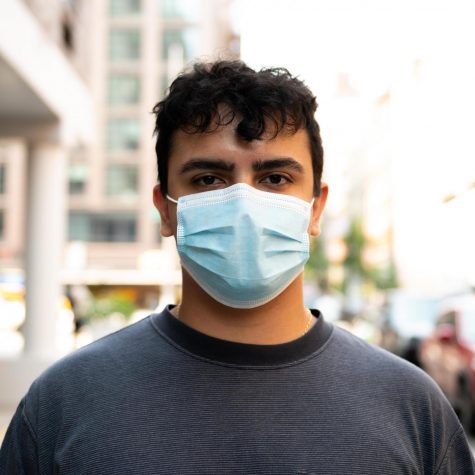The Soapbox: India, Congo, Afghanistan, vaccine inequity in Africa
The Soapbox is a weekly column by WSN’s news desk, examining the major developments in world news and rounding up the stories we think are worth the read this week. Global consciousness for a global university.
The Soapbox is a weekly news column rounding up stories worth reading for a global university. (Staff Illustration by Susan Behrends Valenzuela)
September 13, 2021
In India, a string of attacks on press freedom
The Indian government’s tax collection agency raided the offices of independent online news websites Newslaundry and NewsClick on Friday, Sept. 10, in what advocates, including the Editors Guild of India, have called a “blatant attack” on the freedom of press. During the raids on the two organizations’ New Delhi offices, officials from the Income Tax Department reportedly detained journalists without access to legal counsel and confiscated their electronic devices.
NewsClick was also raided by a separate agency of India’s federal government in February 2021 under anti-money laundering regulations.
On Sept. 11, the Income Tax Department also opened an investigation into Washington Post columnist Rana Ayyub in the state of Uttar Pradesh. “I shall continue to do my journalism,” Ayyub wrote in response.
On Sept. 8, according to the Associated Press, police in Indian-administered Kashmir raided the homes of four journalists, detaining them for hours, and seizing their documents and electronic devices. Authorities have reportedly used beatings and arbitrary detentions to intimidate reporters in the besieged region.
India is one of the most dangerous countries in the world for journalists, according to Reporters Without Borders’ 2021 World Press Freedom Index.
In Congo, an Islamic State offshoot fuels violence against civilians
Recent reports show an armed militia affiliated with the Islamic State group is carrying out major human rights abuses in the eastern part of the Democratic Republic of the Congo.
Recent Al Jazeera reports have documented the killing of nearly 50 civilians in the North Kivu and Ituri provinces since Aug. 28 through arson, stabbing and shooting attacks attributed to the armed Islamist group known as the Allied Democratic Forces.
Founded in 1995, the ADF has developed close ties with the Islamic State group’s Central Africa Province in recent years. It has increased its military footprint several times over since 2017, when IS group propaganda began calling for recruits to join the fighting in Congo. The two eastern provinces of North Kivu and Ituri, where the ADF has recently escalated its insurgency, have been under a state of siege for the past four months.
The United Nations said on Sept. 10 that, due to intensifying human rights abuses in eastern Congo, more than a million Congolese have been internally displaced, with thousands of rapes and civilian deaths recorded during the ADF insurgency this year.
In Kabul, a trail of blood marks 20 years of the war on terror
The U.S. government claimed that its Aug. 29 drone strike on a residential area of Kabul killed a member of the Islamic State group and prevented a car bombing at Kabul’s international airport. The strike follows the suicide attack last month that killed more than 170 Afghan civilians and 13 American soldiers.
“These are ISIS terrorists who killed U.S. service members,” White House Press Secretary Jen Psaki said on Aug. 30, referring to the targets of retaliatory U.S. drone strikes in Afghanistan.
Ten civilians, among them seven children, were killed in the U.S. bombing in Kabul. And a new investigation published by The New York Times on Sept. 10 revealed that the bombing most likely did not kill an IS militant or prevent a terror attack at all.
Alongside extensive interviews, security footage obtained by The Times shows that Zemari Ahmadi — the target of the strike — was not an IS militant, but rather an aid worker coming home after a day of running errands. The “unknown compound” referenced in U.S. military reports was likely the office of the soybean farming NGO where Ahmadi worked. The plastic canisters that he loaded into his car were filled with water for his family to drink, not explosive chemicals.
Throughout the war on terror, U.S. drone strikes supposedly targeting Afghan terrorists have killed civilian passengers in cars, patients in hospitals and farmworkers at a bonfire. The United States has said it will continue to launch over-the-horizon strikes from its bases across the Middle East to fight what President Biden has called “the terrorist threat.”
At the time of the deadly American airstrike, Ahmadi and his family were waiting to be approved for refugee resettlement in the U.S., according to the Times investigation.
Across Africa, a dearth of life-saving vaccines
Virus variants and a lack of vaccine access are prolonging the COVID-19 pandemic across the African continent, public health experts said Thursday, Sept. 9.
“While COVID-19 cases have declined appreciably, the downward trend is frustratingly slow due to the lingering effects of the more infectious delta variant,” regional director for Africa at the World Health Organization Dr. Matshidiso Moeti said. “To ultimately tip the scales against this pandemic, our best efforts to reduce transmission through public health measures must be met by a significant step-up in vaccine supplies and vaccinations.”
According to The New York Times’ global vaccination tracker, Africa is the least vaccinated continent, with fewer than nine shots administered per 100 people, compared to Europe’s 102. In the latest death of an African government official from COVID-19, the former prime minister of the Ivory Coast died in Paris on Sept. 10 after being hospitalized with COVID-19.
The WHO has repeatedly called for a global moratorium on third booster doses of the COVID-19 vaccine until low-income countries can vaccinate majorities of their populations. Dr. John Nkengasong, the director of Africa’s Center for Disease Control, told reporters on Sept. 9 that “we have not seen enough science” to support third doses.
Africa will receive 25% fewer vaccine doses than expected by the end of the year, in part because wealthier countries decided to purchase the booster shots for their populations, the WHO warned on Sept. 9.
“Manufacturers have promised to prioritize COVAX and low-income countries. We don’t want any more promises. We just want the vaccines,” WHO Director-General Dr. Tedros Adhanom Ghebreyesus said on Sept. 8.
A version of this article appeared in the Monday, Sept. 13, 2021, e-print edition. Contact Suhail Gharaibeh at [email protected].

























































































































































